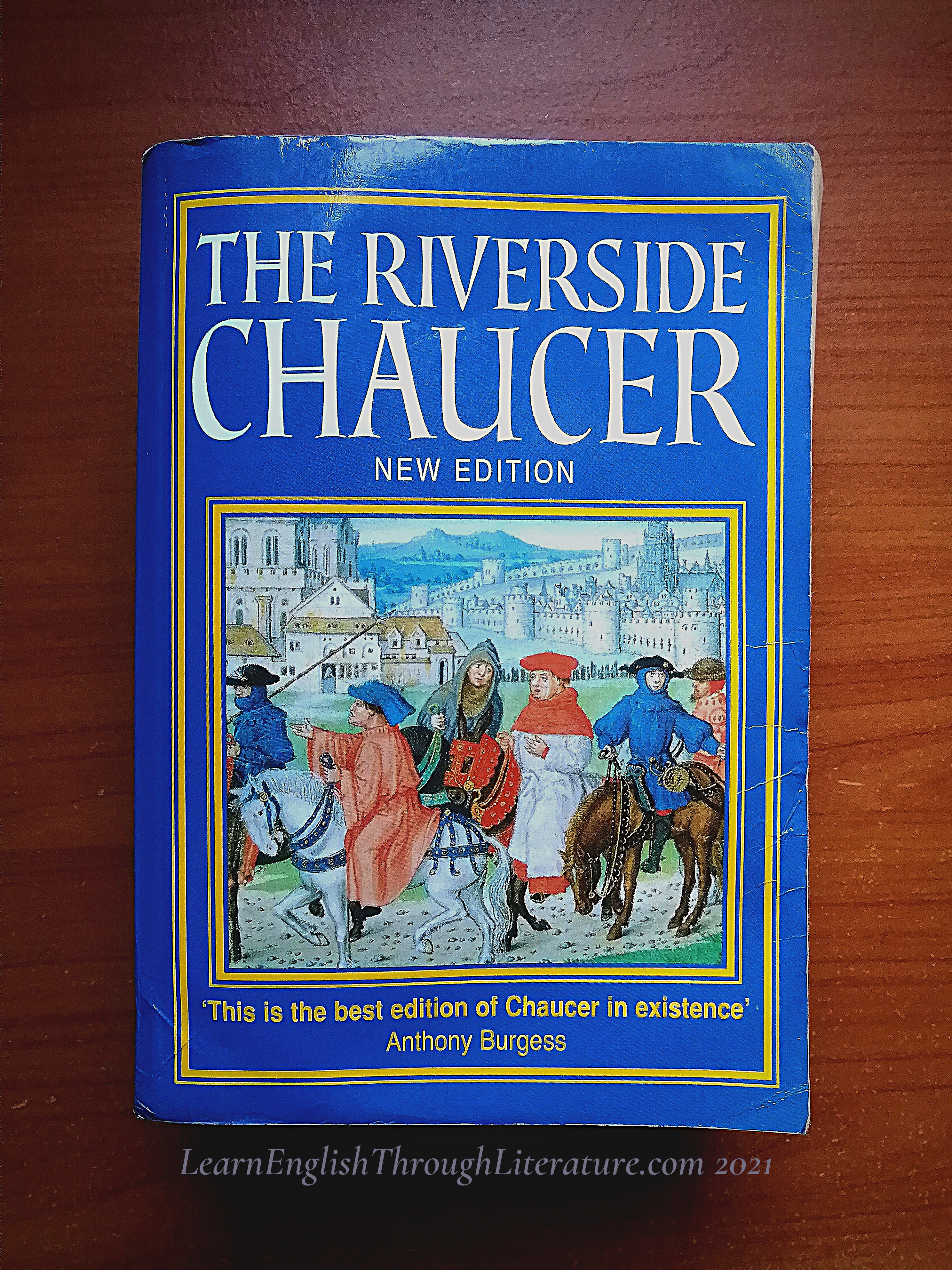I have been looking forward to April for some time, knowing that these lines from the 14th century poet Geoffrey Chaucer would be perfectly seasonable! 🌼
This Lesson is in 3 parts:
- ✏️ A modern translation of Chaucer’s medieval poem’s opening lines (with a vocabulary list)
- ✏️ The original lines in medieval English (just for your curiosity!)
- ✏️ Some thoughts and explanations to help you appreciate it all the more!
…
📝 #1 ‘PROLOGUE’ FROM THE CANTERBURY TALES BY CHAUCER, IN MODERN ENGLISH (translated by myself)
When that April, with his showers sweet,
The drought of March has pierced to the root,
And bathed every vein [plant vein] in such liquor
Of which virtue [power] the flower is engendered [conceived, born],
When Zephyrus [gentle west wind] with his sweet breath
Has also inspired life [breathed life] into every field and wood,
The tender shoots; and the young sun
Has in the Ram [the zodiac sign, Aries – mid-April] his half-course run,
And small birds make melody,
That sleep all the night with open eyes,
So Nature pricks them in their hearts –
Then folk long to go on pilgrimages,
And palm-carriers [pilgrims] seek foreign shores,
For distant shrines, renowned in sundry lands;
And specially, from every shire’s end
Of England, to Canterbury they went,
The holy blissful martyr [St Thomas à Becket, martyred in 1170] there to seek
Who had helped them when they were sick.
..
✏️ VOCABULARY LIST:
drought: a season without rain
liquor: a rich liquid, sometimes alcoholic – but not in this case]
shoots: small new buds or plant growths
has in the Ram his half-course run: This describes the path that the sun takes across the sky around mid-April – it is described as a kind of ‘run’ or journey here.
melody: a pleasant tune
long to go: [they] deeply want, desire to go …
pilgrimages, pilgrims: A pilgrim is a person who travels rough to a holy place, usually to pray or for penance (self-punishing ritual for purification, because of having sinned). A pilgrimage is the journey taken by pilgrims.
renowned: famous [for something]
sundry: various
shire: an English county (district with its own council)
shrine: a holy place, usually with associations or relics (sacred things) connected with a saint or martyr (someone who was killed for their religion).
Canterbury: a small town in Kent, south-east England. It is also the place where Saint Thomas à Becket was killed during a church service in 1170; it was said that even after death he had powers to heal sicknesses, which is why many pilgrims in Chaucer’s story are travelling down to Canterbury on a pilgrimage. Canterbury is also the official seat of the Anglican Church in England.
…
Disclaimer: The lines above are my rough translation (I am not a middle-English scholar by any means!) of the lines below, which Geoffrey Chaucer wrote around 1387-1400. 👇
📜 These are part of the ‘Prologue’ or introductory section of his stories-in-verse collection, The Canterbury Tales. They are famous as one of the earliest works in English literature that is still studied and enjoyed today. Here are the original lines, and you can find here an interesting recording on YouTube of how these words might have sounded when pronounced according to medieval English rules.
…
📝 #2 ‘PROLOGUE’ FROM THE CANTERBURY TALES BY CHAUCER, IN MEDIEVAL ENGLISH (original text and language)
Whan that Aprille with his shoures soote,
The droghte of March hath perced to the roote,
And bathed every veyne in swich licóur
Of which vertú engendred is the flour;
Whan Zephirus eek with his swete breeth
Inspired hath in every holt and heeth
The tendre croppes, and the yonge sonne
Hath in the Ram his halfe cours y-ronne,
And smale foweles maken melodye,
That slepen al the nyght with open ye,
So priketh hem Natúre in hir corages,
Thanne longen folk to goon on pilgrimages,
And palmeres for to seken straunge strondes,
To ferne halwes, kowthe in sondry londes;
And specially, from every shires ende
Of Engelond, to Caunterbury they wende,
The hooly blisful martir for to seke,
That hem hath holpen whan that they were seeke.
…
📝 #3 SOME THOUGHTS AND EXPLANATIONS
Notice 3 things here:
- Many middle-English words look or sound a bit like French words – this is because the Normans (from northern France) had conquered England in the Battle of Hastings (1066) and French was even the language of the English nobility for many years. Chaucer was writing in the English of his time, which was the language that the common people spoke but which was influenced by some French words. So if you notice any words in modern English that sound like they came from French, it is likely that these words were introduced into the language more or less around the time of Chaucer.
- Thanks to the Poetry Foundation for highlighting some ‘e’ letters at the end of each line here – this helps readers to remember that these syllables were emphasised or stressed when spoken aloud in medieval or middle-English. (If you are curious about how the English language changed over the years, you might like to read Lesson #177 where I describe the different stages or eras of the English language’s development.)
- 😉 Lastly, don’t worry about not understanding most of these medieval lines – I don’t expect you to! In fact, most native English speakers don’t either! That is part of the fun found in reading a poem like Chaucer’s once in a while – it helps us to appreciate how much has since changed (or not changed) in terms of language and our experience of Springtime! 🌷🌼🌻




